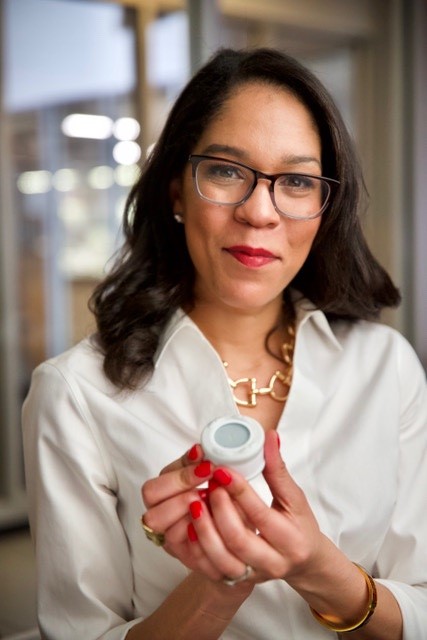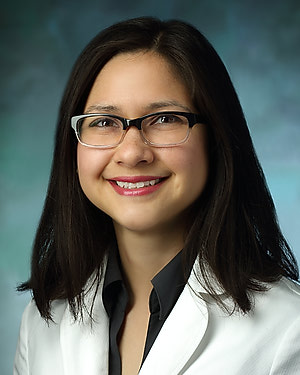For Ellington West, it was being talked over during a pitch. For Dr. Therese Canares, it was the skeptical questions from a banker as she attempted to open a business account.
Starting your own business is difficult enough, but being a woman founder brings additional unique challenges. It is perhaps especially true in digital health, where woman-led startups are more likely to be bootstrapped and less likely to be venture-backed.
West, CEO of Sonavi Labs, and Canares, CEO of CurieDx, both of Baltimore, have faced adversity as woman founders. But they also have continued to grow their companies and networks, drawing support from regional digital health resources, including the Chesapeake Digital Health Exchange (CDHX).
West’s Sonavi Labs is developing Feelix, a digital stethoscope and software platform that applies noise cancellation and AI to detect respiratory conditions, while Canares’ CurieDx is developing a platform that will use AI to bring medical diagnoses for common childhood illnesses. They recently talked about their experiences as entrepreneurs and the future of digital health. (Answers have been edited for length and clarity.)
###
CDHX: What was the moment you said, “I’m going to run my own company”?
West: I was compelled to start Sonavi Labs when I became aware that one child dies every 39 seconds from pneumonia, that African American children right here in Baltimore are three times more likely to die from an asthma attack than any other patient population, and that there is an actionable solution waiting to make an impact. We are bringing to market a tool that not only can help keep those people alive, but empower them to live longer, healthier lives.
Canares: When my daughter was around 1 year old we enrolled her in daycare. In the first three months, she got multiple ear infections plus a couple of cold viruses in between. I remember she would wake up with a fever, and I would give her ibuprofen, tuck her back in, then I would lay awake at night wondering if I did the right thing. Thoughts would race through my head: Is this just a cold or is this something worse? Should I get her checked by her doctor? It was a visceral, anxiety-provoking feeling that I know all parents have been through.
As a pediatric emergency medicine physician, and since becoming a parent, I’ve been especially attuned to supporting parents through their kids’ illness, but I was also left feeling like my reach was limited only to the patients I treat in the ER. I realized I was missing a business skillset, so I enrolled in business school. Over the last few years I earned an MBA, and this coincided with my clinical research on innovation of new digital health tools.

What was the first big decision you made as CEO? Why was it a big decision and what was the outcome?
West: One of the first big decisions I had to make was flipping our model on its head. We started this company to serve emerging markets and underserved communities. Very quickly, I learned that in order to do good in the world, we must do well as a company. We decided to triple down on our North American reimbursement strategy. This unlocks $3 billion a year in potential revenue which we believe will afford us the ability to build a company that can impact lives all over the world.
Canares: I’m currently building our first strategic partnership with a health care system that has over 60 sites around the country. They will be an excellent partner to support data collection that can help build our machine learning algorithm, and a testing ground to beta test the product. This decision required tapping into skills I learned from my negotiation course in business school to understand their perspective, drivers and motivations.
What are the challenges, if any, of being a woman CEO in the digital health world? How have you overcome those?
West: I am often finding myself having to defend my value as a leader or muster the time and energy needed to address the very challenges of being a female CEO in a male-dominated industry. I have had many experiences of being talked over during a pitch or at a conference being mistaken for every other role but the CEO, but those instances of learned bias can’t stop me or slow me down from achieving my mission. However, they must be addressed to ensure the women coming behind me don’t have to experience the same realities.
The best way to overcome these challenges is by surrounding yourself with powerful, brilliant women and like-minded men who are willing to help you move mountains to get the work done. I am proud to be one of few African American women to have raised more than $5 million in funding, but we still have a lot of work to do.
Canares: Just recently, when I opened my business bank account, the banker asked how much revenue the company generates. I said, “$0, we’re pre-revenue.” He replied, “’Well what do you think you will make when you’re up and running?” I shared the predicted revenue. He raised his eyebrows and said, “You really think you’re going to make that much?” He didn’t ask for background data, or inquire how I determined that amount. He simply made a snap judgement that I was not going to be successful. When I encounter doubters or skeptics, it tends to motivate me rather than pull me down. I’m driven to carry on with my plan, and be a role model to other female founders that there’s no limit to your success.
In my journey so far, especially building a health technology company, the majority of mentors, entrepreneurs, engineers and investors I’ve been connected to have been men. Women are certainly a minority in this space. I’ve observed two things from this. One, despite this gender disparity, nearly all of the male contacts I’ve made have been beyond helpful, and strong allies. Second, there are a number of resources and support systems for female leaders that have been instrumental in my entrepreneurial experience. These include the TEDCO Women’s Executive Leadership Roundtable, led by Joni Daniels; The Fourth Floor; The Cru; and Elpha, to name a few. When women support women, great things happen.
How have the local and regional resources and other entrepreneurs helped you?
West: We have been greatly supported by the Johns Hopkins community, where the technology was created. Johns Hopkins Technology Ventures has been hugely supportive and is committed to propelling us forward. The team at Harbor Designs and Manufacturing are also instrumental as our manufacturing partner and they have also allowed us the space to work and come together as a team.
We have also been supported by the local entrepreneurial community including ETC, as veterans of the AccelerateBaltimore program, and LifeBridge Health has offered resources through the BioIncubator program. We have also been able to tap the local U.S. Commercial Service office for guidance and the Maryland Department of Commerce for helping us to expand our reach into international markets.
There are so many great programs and organizations in the area, like TEDCO, UpSurge Baltimore, MiHub and many others that we engage with on a regular basis to find ways to lift Baltimore and all of the entrepreneurs that call this city home.
Canares: The Baltimore/DMV region is certainly a hotspot for digital health entrepreneurship. The Johns Hopkins Technology Ventures and FastForward ecosystem has offered IP and patent advice, the I-Corps customer discovery program, and complimentary office hours with accountants, lawyers, and Microsoft technical advisors. The Chesapeake Digital Health Exchange has offered access to world-renowned CEOs and thought leaders in the space through fireside chats and roundtable discussions. The community at JHU Carey Business School has been incredible for my direct business education, pro bono graduate student consultation, and meeting like-minded individuals. TEDCO Women’s Executive Leadership Roundtable and Health IT workgroup have been extremely valuable to learn about business and leadership challenges, and for building camaraderie with peers. The National Capital Consortium for Pediatric Device Innovation has been a financial support for pediatric device development, and also a great resource for networking and advice for founders.
I was going through a difficult decision some months back and I spoke with a handful of other female founders who had a similar experience. Hearing their stories, how they navigated the decision and the outcome was empowering for me to take a similar leap.

What’s the biggest lesson you’ve learned and what advice would you give aspiring woman entrepreneurs?
West: The biggest lesson I have learned is that I have everything I need at my disposal to succeed and you do, too. It can come from your community and by tapping into and harnessing your own confidence and knowing that not knowing the answer to something is OK. Your job is to find the people that do. Build your network, connect with others and, on your way, help someone else. I encourage every woman who believes that they can be an entrepreneur to go for it. Surprise yourself and make incredible things happen.
Canares: The advice I offer other female founders is to know your worth.
Where do you see the region’s digital health ecosystem 10 years from now?
West: Ten years from now there will hopefully be 10 times as many innovative companies. I believe that Baltimore is on the road to being just as competitive as San Francisco or Boston. We have the talent and some of the world’s most sought-after physicians, engineers, and public health experts consider Baltimore their home. We are seeing collaborations between hospital systems and universities with teams all on a mission to solve some of the biggest problems and challenges the world has ever faced. I want to do my best to support and nurture this thriving region to surpass my wildest dreams. I hope that I can do that through my own investments of capital and time as a mentor to the next generation.
Canares: The talent and innovation that comes from the Johns Hopkins University and University of Maryland networks, combined with the developing pipeline for commercialization will guarantee that this region will be a nexus for the digital health ecosystem. Ten years from now I see a number of companies that come from this region that will have IPOs or big exits. I also envision that at this grand scale the region will be largely influential in developing the IOT of healthcare and improving patient care at each encounter.
Learn more about CDHX






